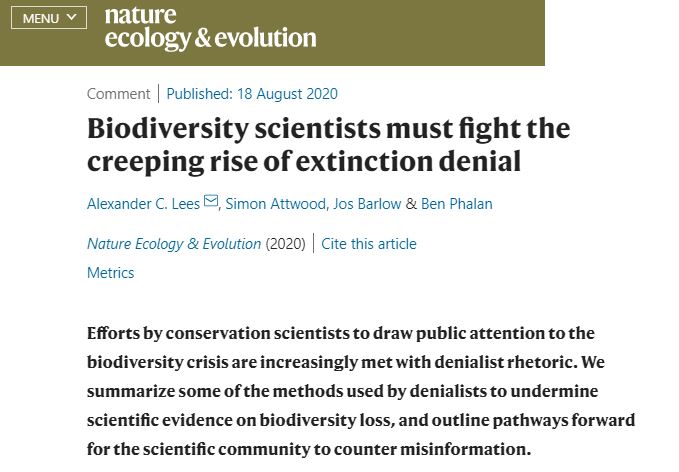
Prioritising individual animal welfare can clash with conserving whole species and can risk negative outcomes for biodiversity conservation. An open letter to animal rights folks. Thread 👇 

The interests of conservationists & animal rights activists overlap in ending illegal wildlife persecution + illegal trade in threatened species & in concern for the state of animal agriculture - the synergy between land-use & climate change is the greatest threat to biodiversity 

Moreover, fighting for better farm animal welfare, an end to cruelty, live exports etc, humanness of trapping methods are not the dominion of conservation, although many of us may have strong opinions which are likely to overlap with yours.
However, there are several tropes of animal rights activism which clash with conservation goals. Namely 1) trophy hunting bans 2) invasive species control 3) native herbivore and predator control, 4) the role of zoos and 5) what conservation means. I’ll deal with each in turn....
First, trophy hunting - a very flawed conservation model, but it is a model and 1.3 million km2 is set aside for it in sub-Saharan Africa (more than the area protected by national parks) sciencedirect.com/science/articl…
These game reserves protect (and in many cases have restored from farmland) millions of hectares of habitat and associated biodiversity which would otherwise be vulnerable to land-use change or poaching or both africageographic.com/stories/privat…
Trophy hunting, like ecotourism can lack resilience to shocks - like the drop in international visitors associated with Covid-19 nature.com/articles/s4155… and we need to look for alternative scalable solutions to protect wildlands in the Global South. 

But, if it were banned now, there can be no doubt that it would result in catastrophic loss of wildlife and wild spaces. Avoiding land use change via habitat loss is too dangerous to risk. conbio.onlinelibrary.wiley.com/doi/full/10.11…
2nd, invasive species, a major cause of recent extinctions. Eradicating species like rats, cats and mice by trapping, poisoning etc has been a mainstay of the conservation biologist toolkit and saved species from extinction sciencedirect.com/science/articl…
If there were scalable and cost-effective alternatives to killing available then we would be doing those things. But there aren’t. We strive to be as humane as circumstance allows. Putting your head in the sand is invasive species denialism sciencedirect.com/science/articl…
For example, an Italian AR group blocked an attempt to eradicate Grey Squirrels, leading to the loss of a key time window in which eradication was viable. We may now eventually see the extinction of Red Squirrel across Eurasia sciencedirect.com/science/articl… 

Third wildlife management. Britain is a small nature depleted island, its is trophically downgraded and ecologically unbalanced. We have destroyed and downgraded wildlife habitat and removed apex predators nbn.org.uk/stateofnature2…
The consequences are a proliferation of both medium-large herbivores (including non-native ones) and intelligent mesopredators (often omnivores including non-native ones) which can thrive in the mess of our making onlinelibrary.wiley.com/doi/full/10.11…
Restoring habitat and species should be our key aim, but even in the best case scenarios it is likely that people will have to play the apex predator role to regulate grazing, browsing and predation in and around human-modified landscapes onlinelibrary.wiley.com/doi/full/10.11…
In wilderness, untrammelled nature look can after itself, but if you want Curlews, Montagu’s Harriers and Nightingales to persist in southern England in human-modified landscapes then control of Foxes, Carrion Crows and Muntjac is a necessarily intervention.
You could argue that we could just let the aforementioned disappear and be happy with an impoverished homogenised McWildlife but that is not what conservation biologists stands for. 

Fourth, zoos, yes, there are weak zoos which serve no conservation ends & have a weak role in environmental education. Tarring them all as ‘animal prisons’ misses however the fundamental role that ex situ conservation has in saving species from extinction conbio.onlinelibrary.wiley.com/doi/full/10.11…
rest of the thread here:
https://twitter.com/Alexander_Lees/status/1423275358313345031
• • •
Missing some Tweet in this thread? You can try to
force a refresh






